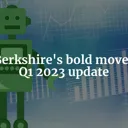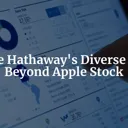Tags: Apple / BofA / BHE / Gen Re
This fanpage is not officially affiliated with Berkshire Hathaway: Disclaimer
From strategic investments in Apple and (a bit) Amazon to the transformative and beneficial impact on its subsidiaries in the energy and insurance sector: Find out why Berkshire Hathaway is well positioned for the ongoing AI revolution!

Introduction
For decades, Berkshire Hathaway, under the astute leadership of Warren Buffett, has been synonymous with a conservative investment strategy, often shying away from the volatile tech sector. However, in a remarkable pivot that underscores the seismic shifts in the global economic landscape, Berkshire Hathaway has embraced the burgeoning field of artificial intelligence [AI]. This strategic realignment is not just a nod to the future but a bold acknowledgment of AI's potential to add a staggering $15.7 trillion to the global GDP by the end of this decade 1.
The inclusion of tech giants like Apple and innovative financial institutions such as Bank of America in Berkshire's portfolio is an indirect but very clear sign. The current portfolio construction might be rooted in or suported by an understanding that the AI revolution, much like the industrial and digital revolutions before it, presents unparalleled opportunities. Berkshire Hathaway's foray into AI, therefore, is not merely an expansion of its investment horizon but a strategic positioning to capitalize on the next wave of economic growth driven by technological innovation.
This article aims to dissect Berkshire Hathaway's strategic maneuver into the AI domain, offering a blend of historical insights, economic analysis, and a deep dive into how its key investments and subsidiaries are poised to benefit from the AI boom. Through this exploration, we will uncover the rationale behind Berkshire Hathaway's pivot and its implications for the conglomerate's future growth trajectory in the era of AI.
No discussion on AI would be complete without mentioning the FAANG companies 13. Let's begin with the 'two A's'—Apple and Amazon—which, notably, are both part of Berkshire Hathaway's portfolio. We follow with an AI initiative by Bank of America, Berkshire's second largest holding. Afterwards we shall discuss the impact on Berkshire's very own energy and insurance subsidiaries. We close with some thoughts on the impact of AI on economics and society in general and its strategic implications for Berkshire Hathaway specifically.
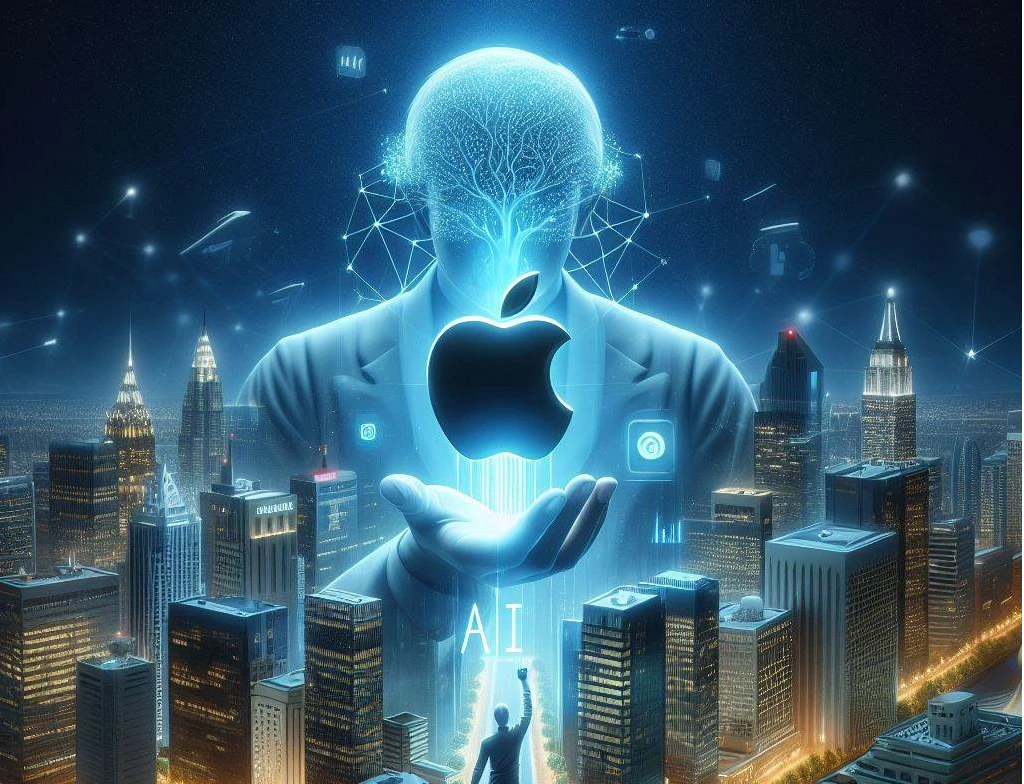
Investment in Apple
At the heart of Berkshire Hathaway's strategic embrace of AI lies its significant investment in Apple ↗. With over $150 billion invested, Apple stands as the largest position in Berkshire's stock portfolio, a testament to Warren Buffett's belief in the tech giant's enduring value proposition 1. Apple's integration of AI across its suite of products and services is not just enhancing user experiences but is also pushing the boundaries of innovation. From the sophisticated algorithms that power its Photos app to the natural language processing capabilities of Siri, Apple is leveraging AI to solidify its market leadership and drive growth.
The company's commitment to staying at the forefront of the generative AI landscape is evident in its massive investment plan. With a projected expenditure of $620 million in generative AI in 2023, scaling up to an anticipated $4.75 billion by 2024, Apple is gearing up to compete with tech behemoths like Meta, Microsoft, and Google 6 ↗. This financial commitment underscores the strategic importance of AI in Apple's roadmap, with significant enhancements planned for popular applications such as Siri, Messages, and Apple Music.
Apple's financial strength, with a 2022 revenue of $394 billion and $383 billion in 2023 and an operating income exceeding $110 billion for both years, forms a solid foundation for its ambitious AI ventures 2. This financial prowess, combined with its high customer loyalty and a strong management team, aligns well with Berkshire Hathaway's investment philosophy, which favors companies with robust moats and growth prospects.
While Apple may currently be perceived as lagging behind in the realm of AI, it's important to acknowledge that Siri emerged as one of the earliest practical virtual assistants, debuting on the iPhone back in 2011 11. This early integration suggests that Apple possesses a foundational understanding of the artificial intelligence landscape and is poised to reclaim a leadership position in the field.
Investing in Apple, therefore, is not just a bet on a leading technology company but a strategic move to capitalize on the AI-driven transformation of the global economy. The implications of Apple's AI investments for Berkshire Hathaway are profound, promising to contribute significantly to the conglomerate's long-term growth. By backing a company that is at the forefront of the AI revolution, Berkshire Hathaway is positioning itself to reap the benefits of technological innovation, much like it did by investing early in companies that led previous technological revolutions.
In essence, Berkshire Hathaway's investment in Apple exemplifies its strategic pivot towards embracing the AI revolution, marking a new chapter in its storied investment legacy. As AI continues to reshape industries and economies, Berkshire Hathaway's stake in Apple not only reflects its adaptability but also its foresight in navigating the complexities of the modern technological landscape.
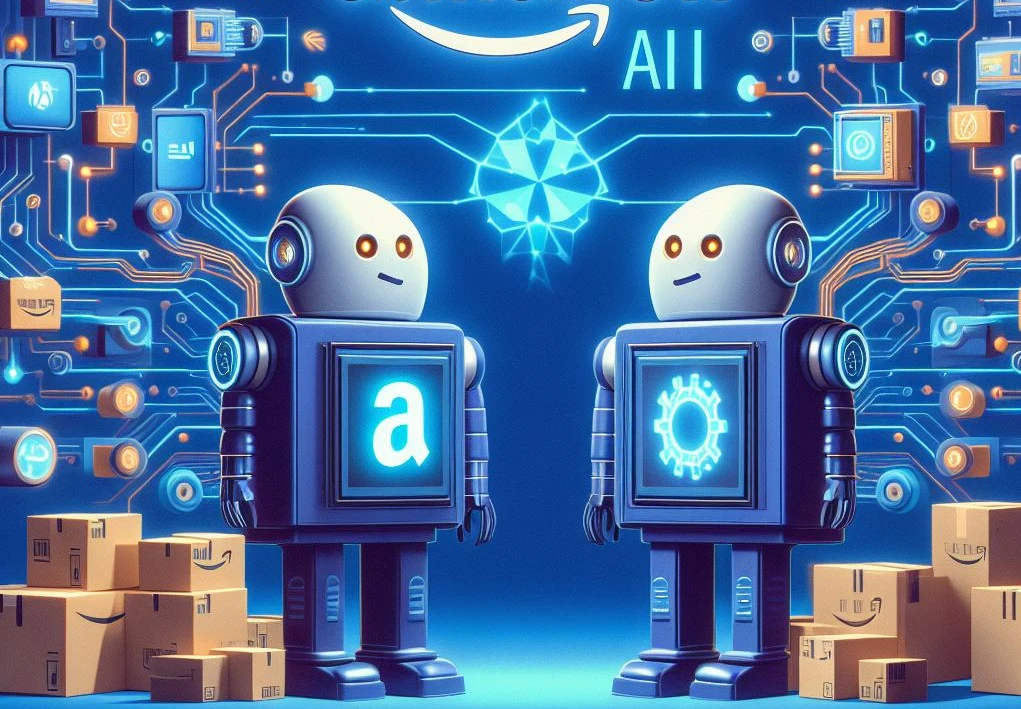
Amazon’s Influence
It is less known that Berkshire holds approximately 10 Million shares of tech giant Amazon since 2019 12. Even though this approximately $2 billion position is only minor compared to Apple's $150 billion, let us nevertheless briefly dive into Amazon and its AI prospects. Leaving Amazon out of the discussion would be a bold move on its own...
Amazon's role in the AI revolution is twofold, serving both as a pioneer in AI-driven e-commerce operations and as a backbone for AI infrastructure through its AWS services. Berkshire Hathaway's strategic investment of around $1.7 billion in Amazon underscores the significance of this dual role. The investment is not just a stake in a leading global retailer but also a bet on the companys deep involvement in AI technology, which powers a broad spectrum of applications across industries 1.
AWS, with its 31% share of global cloud infrastructure spend, is at the forefront of powering AI applications. This dominance in cloud computing positions Amazon as a critical player in the AI landscape, much like the railroads were to the industrial revolution, facilitating not just commerce but also innovation at a scale previously unimaginable 1. Amazon's commitment to AI is further evidenced by its investment in Anthropic, focusing on AI operations, signaling a clear intent to lead in the development and application of AI technologies 3.
Aside AWS it's a fascinating tidbit that Apple's Siri debuted in 2011, even before Amazon's Alexa, which was still in development under the project codename 'Doppler' until its release in 2014. Both companies faced challenges in bringing their virtual assistants to market, navigating a bumpy road to launch. However, as AI technology advances, we anticipate significant enhancements in the user experience of both Siri and Alexa over the coming years.
The efficiency Amazon has achieved in logistics and cloud computing through AI is reminiscent of historical shifts in industrial efficiency that reshaped markets and economies. The potential for Amazon's AI advancements to influence broader market trends cannot be overstated. For Berkshire Hathaway, the investment in Amazon is not merely a financial stake but a strategic position in a company that is shaping the future of technology and commerce.
Berkshire Hathaway's foresight in investing in Amazon reflects an understanding of the company's integral role in the AI revolution ↗↗. As AI continues to evolve, Amazon's innovations in AI could significantly impact market dynamics, making Berkshire Hathaway's investment potentially even more valuable. The strategic importance of Amazon in Berkshire Hathaway's portfolio highlights not just a belief in the company's current value but also confidence in its ability to drive and benefit from technological advancements.
Bank of America’s AI Integration
Bank of America is Berkshire's second largest holding worth approximately $38 billion ↗. So after we outlined the canonical AI suspects in Berkshire's portfolio it is very interesting to see what Bank of America is doing in terms of the AI race.
The integration of Erica, an AI chatbot, into Bank of America's digital banking platform, represents a significant leap forward in customer service efficiency. With Erica, Bank of America has not just introduced a digital assistant but has redefined how customers interact with their bank. Since its launch, Erica has surpassed 1.5 billion client interactions, demonstrating the vast scale at which AI can enhance customer engagement 7.
Bank of America's commitment to leveraging technology is further highlighted by its substantial $3.8 billion innovation investment. This investment underscores the bank's proactive approach to integrating AI and other technologies into its operations, setting a precedent for the banking industry 3. The potential for AI to revolutionize banking is immense, akin to historical banking innovations such as the introduction of ATMs or online banking, which fundamentally changed how banking services are delivered and consumed.
The strategic importance of investing in financial institutions like Bank of America, which embrace technological advancements, cannot be underestimated. For Berkshire Hathaway, this investment reflects a broader strategy of supporting companies at the forefront of the AI revolution. Bank of America's efforts to engage clients through technology, particularly through Erica, not only enhance operational efficiency but also strengthen customer relationships and competitive advantage 7.
The implications of AI in banking extend beyond customer service efficiency to include risk management, personalized banking solutions, and fraud detection, among others. Bank of America's proactive approach to AI integration, as evidenced by the success of Erica, reflects positively on Berkshire Hathaway's investment strategy, highlighting the conglomerate's commitment to investing in companies that are leading the way in technological innovation.
After examining the AI endeavors of Berkshire's investments Apple, Amazon, and Bank of America, it's prudent to also explore how the subsidiaries of Berkshire Hathaway are adapting to and benefiting from the AI race.

Berkshire Hathaway Energy: Embracing the AI Revolution
Berkshire Hathaway Energy [BHE]↗ has embarked on an ambitious journey to harness the power of artificial intelligence (AI) to revolutionize the energy sector. This strategic move is epitomized by BHE Renewables and MidAmerican Energy's renewal and expansion of their contract with Uptake Technologies. The expanded use of Uptake's AI-enabled Software as a Service (SaaS) products across an additional 13 sites and 2,283 megawatts is a testament to the potential Berkshire Hathaway sees in AI to optimize maintenance operations and significantly increase energy production 4.
The expected increase in annual energy production, thanks to Uptake's power performance AI application, which has proven to increase energy production up to 2% at wind sites, is not just a win for Berkshire Hathaway but a boon for the energy sector at large 4. This investment in energy efficiency and innovation comes at a critical time, as AI's demand for energy is skyrocketing, causing a huge increase in U.S. energy consumption and straining the power grid 10. The historical transformations of the energy sector have always been spurred by innovation, and AI represents the next frontier in this evolution.
The strategic foresight of Berkshire Hathaway in investing in sectors that not only adopt AI but also support its infrastructure is evident. By focusing on energy efficiency and innovation, Berkshire Hathaway is not just adapting to the AI revolution but is actively shaping the future of energy production, distribution, and consumption patterns. This approach reflects Berkshire Hathaway's commitment to sustainable and profitable growth, acknowledging the environmental and economic implications of AI in energy.
As AI servers generate five times more heat than traditional CPU servers and require ten times more cooling per square foot, the need for innovative solutions like those provided by Uptake Technologies becomes even more critical 10. Berkshire Hathaway Energy's adoption of AI is a clear indication of its commitment to leading the charge in the energy sector's transformation, ensuring that it remains competitive and continues to provide value to its shareholders and society at large.
So we have seen that Berkshire Hathaway Energy is going to adapt using AI. However, AI creates hugely increased energy demand as well. Let's delve into why Berkshire Hathaway Energy, as an energy supply company, is well-prepared to profit from the AI revolution:
| AI Energy Topic / Theme | Arguments in favor of Berkshire Hathaway Energy |
|---|---|
| Growing Energy Demand |
|
| Data Centers and Cloud Services |
|
| AI Hardware Manufacturing |
|
| Electric Vehicles and AI |
|
| Energy Storage Solutions |
|
| Renewable Energy Integration |
|
| Strategic Positioning |
|
BHE's readiness to meet increased energy demand—driven by the AI sector—positions it as a key player in powering the AI revolution. In turn, Berkshire Hathaway Energy might be one of the shovelmakers in the AI revolution. We will see this thematic come up in the next section as well.
To clarify, the energy business is notably capital-intensive. Consequently, Berkshire Hathaway Energy potentially holds a distinct advantage due to the substantial financial resources of its parent company. - Yes, float, you name it! That being said, let's have a look at the potential benefits that the insurance companies within Berkshire might reap from the AI revolution.

Insurance Subsidiaries and AI Revolution
With more than 43,000 employees in the insurance sector, Berkshire Hathaway is surely one of the main players in this field. In 2024, the insurance sector stands on the cusp of the AI revolution as many other industries. The potential for AI to transform the industry from a "detect and repair" model to a "predict and prevent" paradigm is immense 5. This shift is not just theoretical but is already being realized through specific AI applications in risk assessment, fraud detection, and customer service, which promise to revolutionize insurance.
Generally, insurance companies might be utilizing generative AI more frequently for several reasons, since generative AI might/can be used to9:
- enhance communication with insurance customers.
- offer hyper-personalization in customer service.
- improve transparency in coverage decisions.
- enhance real-time data management.
- provide advanced explainability in user experiences.
- offer prescriptive actions with probabilistic outcomes.
- analyze data, identifying patterns, anomalies, and consistencies across datasets.
Gen Re, a part of Berkshire Hathaway, underscores the workflow as a significant benefit of generative AI, signaling a broader impact on efficiency and productivity within the insurance sector 8. This emphasis on workflow improvements, coupled with the practical applications of generative AI as suggested by Andrew Schwartz from Celent, including claims processing, marketing, fraud detection, and underwriting, paints a picture of an industry on the brink of transformative change 8.
However, there is another side to this story. Not only the implementation of AI might be beneficial to Berkshire's insurance subsidiaries. There might also be increased demand: Just as the shovelmakers during the gold rush found themselves in a lucrative position by supplying essential tools to prospectors, Berkshire's insurance companies could indeed benefit from the AI boom in a similar vein.
Here's how insuring data centers and related AI infrastructure aligns with the gold rush analogy:
| AI Topic | Analogy to the Gold Rush: Insurance Shovelmakers |
|---|---|
| Data Centers: The Modern Gold Mines |
|
| Risk and Uncertainty |
|
| AI Infrastructure and Its Value |
|
| Emerging AI Risks |
|
| Business Continuity and Recovery |
|
| Market Demand and Growth |
|
| Strategic Positioning |
|
Insuring data centers and AI infrastructure is akin to supplying shovels during the gold rush—a smart move that positions insurers to profit from the digital gold rush of our time!
The historical impact of technological innovations on the insurance industry offers a parallel to the current potential of AI. Just as the introduction of the automobile and the internet fundamentally changed the nature of insurance, AI promises to usher in a new era characterized by efficiency, predictive accuracy, and enhanced customer service.
For Berkshire Hathaway's insurance subsidiaries, the implications of AI-driven changes and AI-generated demand are profound ↗. The potential for profitability and market positioning in an industry leveraging AI to not only improve operational efficiency but also to fundamentally rethink insurance products and services is significant. The analogy of "shovel-makers in the gold rush" is apt, as Berkshire's insurance entities stand to benefit greatly from insuring AI-driven operations and data centers, reflecting the strategic importance of understanding and investing in AI technology within the insurance sector 10.
The AI revolution in the insurance sector represents a pivotal moment for Berkshire Hathaway. By embracing AI's potential to transform from "detect and repair" to "predict and prevent," Berkshire Hathaway can maintain its competitive edge, offering innovative products and services that meet the evolving needs of consumers and businesses alike. The journey into the AI-driven future of insurance is not without challenges, but for a conglomerate like Berkshire Hathaway, it is a journey filled with opportunities for growth, innovation, and leadership in the new era of insurance. We can be sure that Berkshire's excessive float at almost $170 billion ↗ might be quite helpful along the way...
The Economic and Societal Impact of AI; Strategic Implications for Berkshire Hathaway
The dawn of the AI revolution heralds a transformative era not only for the global economy including Berkshire Hathaway but also for societal norms and structures. With AI solutions poised to add an astonishing $15.7 trillion to global GDP by the end of the decade 1, we stand on the precipice of change comparable to the industrial revolution or the advent of the internet. This monumental growth stems from AI's ability to optimize operations, innovate product development, and redefine service delivery across industries.
However, the economic boon is only one facet of AI's impact. Societally, AI introduces complex dynamics concerning employment, privacy, and ethical considerations. As machines become capable of performing tasks traditionally done by humans, from driving trucks to diagnosing diseases, the nature of work and employment will inevitably evolve. While some jobs may become obsolete, AI also has the potential to create new roles and industries, much as past technological revolutions have done.
Privacy concerns escalate as AI systems, which thrive on vast datasets, blur the lines between public and personal information. The ethical use of AI, particularly in sensitive areas such as surveillance and decision-making, becomes paramount. The historical context of technological revolutions teaches us that while technology can dramatically improve living standards, its benefits and burdens are often unevenly distributed without careful planning and regulation.
Strategic investment in AI, therefore, is not merely an economic consideration but a societal imperative. Berkshire Hathaway, with its significant influence and investment strategy, plays a critical role in this transformation. The conglomerate's approach to AI investment reflects not only an anticipation of economic shifts but also an acknowledgment of the broader societal implications. As AI reshapes industries and economies, the challenges and opportunities it presents for investors, companies, and society at large are immense. Regulatory and ethical frameworks will be crucial in guiding the development and application of AI technology, ensuring that its benefits are maximized while its risks are mitigated.
Berkshire Hathaway's strategic investments in AI-driven companies and sectors underscore the conglomerate's foresight and adaptability in the face of technological revolutions. Notably, it's not just the investments that are in the frame of AI; subsidiaries are also gearing up to leverage and benefit from AI advancements. With a significant portion of its portfolio invested in companies at the forefront of AI innovation, such as Apple and (a bit of) Amazon and Snowflake 14, Berkshire Hathaway is well-positioned to capitalize on the AI revolution across multiple industries 1.
These investments are not merely financial bets but strategic moves that align with Warren Buffett's investment philosophy, which emphasizes long-term value, strong management teams, and companies with a competitive edge. Apple, with its integration of AI in products and services, exemplifies this approach, leveraging AI to enhance customer loyalty and maintain its market leadership. Similarly, Amazon and Snowflake14 utilize AI to innovate and drive efficiency, contributing to Berkshire Hathaway's diversified portfolio's strength and resilience.
Looking ahead, the potential for Berkshire Hathaway to further diversify its investments in AI and technology sectors is significant. As AI continues to evolve and permeate various industries, opportunities for strategic investments that align with Berkshire's criteria for long-term growth and profitability will likely emerge. The conglomerate's ability to adapt its investment strategy in response to technological trends, while maintaining its core investment philosophy, will be key to its continued success.
However, on the flip side, Berkshire Hathaway's strategic involvement across sectors like energy, insurance, and numerous others positions the company as a pivotal enabler of the AI revolution. With its diverse portfolio and influential players in various industries, Berkshire Hathaway is poised to emerge as the cornerstone of innovation akin to the shovelmaker of the 21st century.
The implications of AI for Berkshire Hathaway extend beyond financial performance. As AI reshapes market dynamics and consumer behaviors, Berkshire's long-term growth, profitability, and market positioning will depend on its ability to innovate and adapt. This not only involves making strategic investments in AI-driven companies but also integrating AI technologies within its own operations and portfolio companies to enhance efficiency and competitiveness.
In an AI-driven future, Berkshire Hathaway's continued innovation and adaptation will be crucial in maintaining its competitive edge. The conglomerate has the potential to lead by example, influencing broader investment trends in the AI space and demonstrating the importance of strategic, ethical, and forward-thinking investment practices. As we navigate the AI revolution, Berkshire Hathaway's approach offers valuable insights into the strategic implications of AI for investors and companies alike, highlighting the importance of vision, adaptability, and responsibility in shaping the future.
Wow, that was quite long. Thank you for still being here!
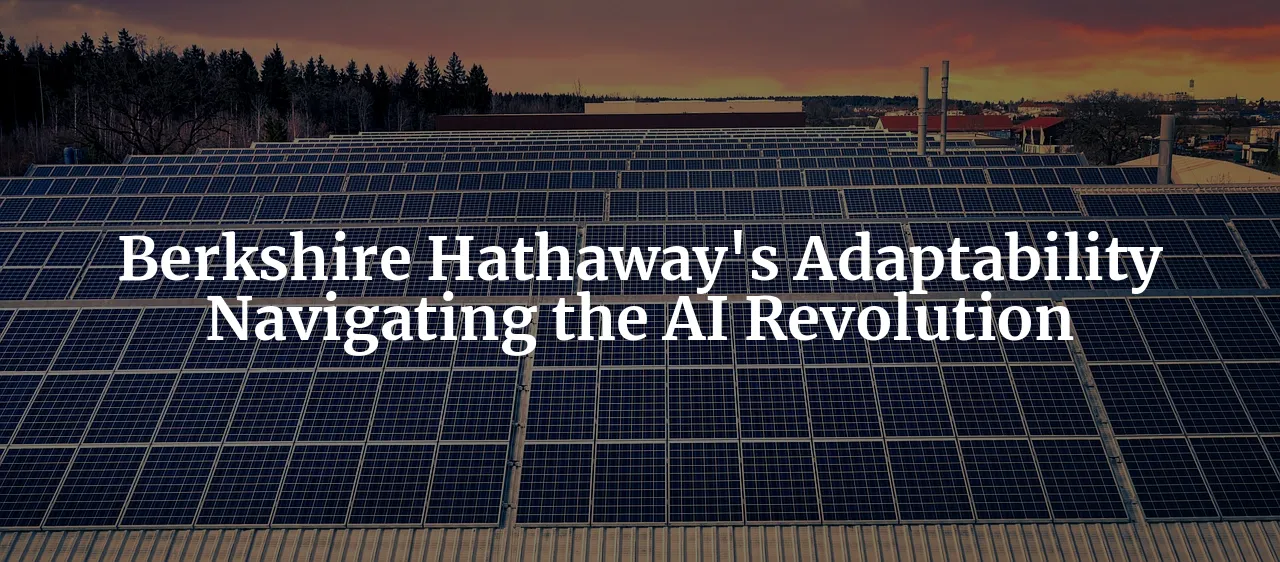
Conclusion
Berkshire Hathaway's strategic pivot towards embracing the AI revolution reveals a strong positioning to benefit from the ongoing boom. By investing in companies like Apple, Amazon, Bank of America, and with subsidiaries such as Berkshire Hathaway Energy that are both enabling and at the forefront of AI innovation, Berkshire Hathaway is positioning itself to capitalize on the next wave of economic growth driven by technological advancements.
The historical significance of technological revolutions, from the industrial revolution to the digital age, underscores the importance of adapting to and investing in transformative technologies. Berkshire Hathaway's ability to recognize and capitalize on these shifts has been a key factor in its long-term success, and its foray into AI is a testament to its adaptability and foresight.
As AI continues to reshape industries, economies, and societal norms, Berkshire Hathaway's strategic investments in AI-driven companies and sectors will play a crucial role in shaping its future growth trajectory. The potential for AI to transform operations, drive innovation, and enhance efficiency across multiple industries is immense, and Berkshire Hathaway's strategic positioning puts it in a favorable position to benefit from these changes and increasing demand.
Looking ahead, the implications of AI for Berkshire Hathaway extend beyond financial performance. As AI becomes increasingly integrated into various sectors, Berkshire Hathaway's ability to innovate, adapt, and lead by example will be critical in maintaining its competitive edge. The conglomerate's commitment to ethical and responsible investment practices, coupled with its focus on long-term value creation, will be key in navigating the complexities of the AI revolution.
As we stand on the brink of a new era defined by AI technology, Berkshire Hathaway's approach offers valuable insights into the strategic implications of AI for investors and companies alike. By encouraging readers to consider the long-term implications of AI on their investment strategies and highlighting the importance of adaptability and foresight, Berkshire Hathaway sets a precedent for navigating the AI revolution with confidence and vision.
I invite readers to engage further with the topic of AI and its implications for investors and society. By staying informed and proactive in understanding the potential of AI to transform industries, economies, and everyday life, investors can position themselves to benefit from the opportunities presented by the AI revolution. As Berkshire Hathaway continues to lead by example in embracing AI innovation, it serves as a beacon for investors seeking to navigate the complexities of the modern technological landscape and seize the opportunities that lie ahead.
References
-
44% of Warren Buffett's $366 Billion Portfolio Is Invested in 3 Widely Owned Artificial Intelligence (AI) Stocks | The Motley Fool - www.fool.com ↩↩↩↩↩↩
-
How Do AI Growth Stocks Dominate Berkshire Hathaway's Holdings? Warren Buffett's Bold Stance | Cryptopolitan - www.cryptopolitan.com ↩
-
Berkshire Hathaway expands into AI sector with diverse portfolio By Investing.com - www.investing.com ↩↩
-
Berkshire Hathaway Energy Subsidiaries Double Down on AI and - www.globalenergyworld.com ↩↩
-
Insurance 2030—The impact of AI on the future of insurance - www.mckinsey.com ↩
-
Apple’s Massive AI Investment To Take On Tech Giants in 2024 - spotlight.designrush.com ↩
-
BofA’s Erica Surpasses 1.5 Billion Client Interactions, Totaling More Than 10 Million Hours of Conversations - newsroom.bankofamerica.com ↩↩
-
Berkshire Hathaway's Gen Re unit stresses workflow as big benefit of Gen AI - www.dig-in.com ↩↩
-
Gen AI's potential will attract more insurers to use it in '24 - www.dig-in.com ↩
-
AI sparks huge increase in U.S. energy consumption and is straining the power grid; transmission/distribution as a major problem - techblog.comsoc.org ↩↩↩
-
From Siri to Sophia: A Journey Through the Evolution of AI - statusneo.com ↩
-
Berkshire Hathaway's Amazon.com Stake - stockcircle.com ↩
-
FAANG of course stands for Facebook (now Meta), Amazon, Apple, Netflix and Google. However, in 2024 it might be fair to replace Netflix with the new rising star of AI, Nvidia. That wouldn't be the first change of the list as Apple was only added to FANG in 2017. So if Nvidia becomes part of FAANG, you heard it first on brk-b.com ;) ↩
-
Berkshire also holds a 1.9% in Snowflake, worth approximately $1 billion at the time of writing. Snowflake Inc. "offers a cloud-based data storage and analytics service, generally termed data-as-a-service" as outlined on Wikipedia. The company might be an interesting play in the AI race. ↩↩
